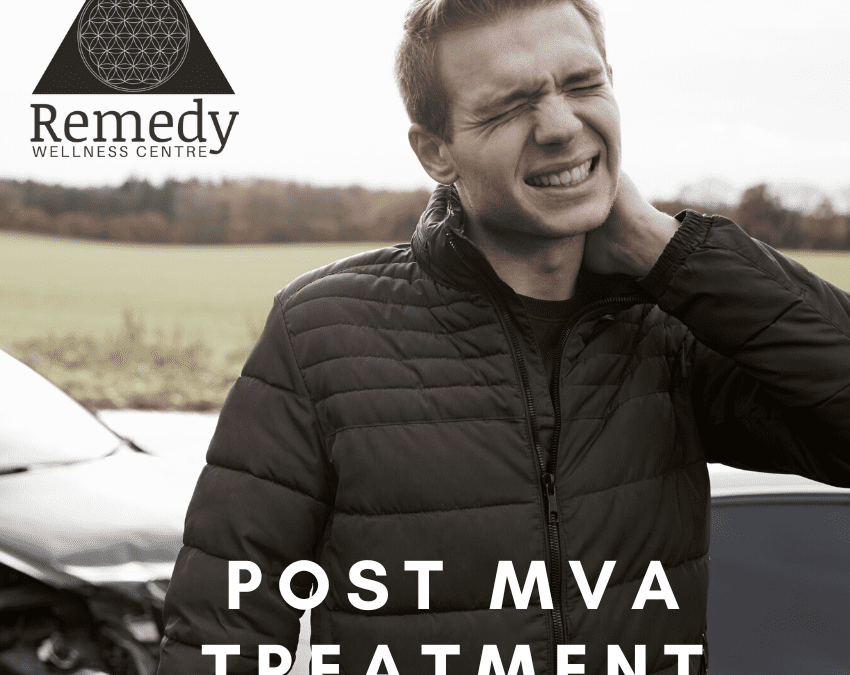If you’ve been in an MVA (Motor Vehicle Accident), you may be experiencing some back pain, neck pain and headaches, among other common injuries. Early intervention with treatment has been shown to significantly improve the chances of walking away with no lasting pain or disability. Here are some of the things we most commonly treat at Remedy Wellness Centre, after an MVA
- Headaches and Migraines
- Neck Pain and Whiplash
- Shoulder Pain
- Lower Back Pain
- Trauma, Anxiety and PTSD
- Post Surgical Rehab
- Post Immobilization Rehab
- Concussion
- Nerve Pain
Whiplash is one of the most common injuries post MVA, in which the head and neck are forcefully accelerated and then recoil in the opposite direction. Essentially a snap back and forward, under force from the impact. This results in hyperextension/hyperflexion syndrome, commonly called whiplash, and it typically occurs when you get rear ended. Most injuries from MVA’s involve over-stretching/straining of the muscles which stabilize the area (spine, shoulder, hip, knee, etc.) and if the impact was high velocity there could also be strain of the joint capsule which surrounds each joint, the ligaments between the joints and the vertebrae, and/or the vertebral disks.
This means the area has lost its structural integrity and is now unstable. In cases of untreated whiplash, the neck loses it’s natural curve due to the laxity of the ligaments. This can lead to deposits of extra bone, which over time can develop into osteoarthritis. Some of the symptoms you experience may include neck pain, headaches, TMJ dysfunction, brain fog, nerve pain into the arm (s), pain that radiates into the back or arms, stiffness and/or reduced range of motion.
The severity of your symptoms will determine where you should start. Some patients have very mild symptoms and are able to tolerate manual therapy and exercise rehabilitation very soon. These patients can start with massage, chiropractic or physiotherapy right away. Others are in a lot of pain, and can hardly stand to be touched or moved. In this case, very gentle massage therapy in combination with acupuncture and counselling may be the best place to start. We have ample experience working with both and everything in between.
Trauma, Anxiety and PTSD: pain is our body’s method of measuring how much threat we are under. Unresolved trauma can amplify your pain response, and contributes to acute pain turning into chronic pain. Counselling is highly recommended if you’ve been in an MVA, even if you don’t think you need it and especially if your pain lasts more than 3 months. Unless your physical injuries are severe, most soft tissue damage will resolve in less than 3 months. If you still have pain, after 3 months, it is likely not “issues in the tissues.” There’s a great short book called Explain Pain my Mosely and Butler that explains it. You can also find some great YouTube videos, such as “Tame the Beast.”
If you really don’t want to try counselling, we recommend acupuncture as an alternative method to release trauma through needling and TCM. Sometimes you don’t have to put things into words to effectively process them and let them go. Our acupuncturist, Caroline O’Hara has a special interest in acupuncture for trauma and mental wellness.
Fortunately, ICBC covers most treatment for MVA injuries. You can read more about what’s covered and our direct billing policies HERE.

